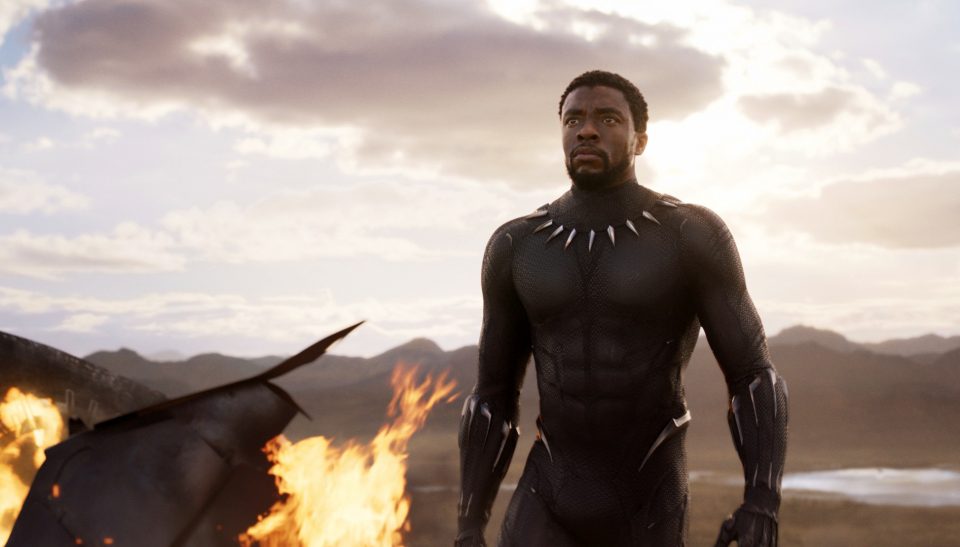Review: Kendrick Lamar Goes Superhero-Producer on ‘Black Panther’ Soundtrack
The hip-hop visionary creates and curates music to explore age-old dreams and 21st Century politics

It is tempting to compare 'Black Panther' to Curtis Mayfield's 'Superfly' and Marvin Gaye's 'Trouble Man,' classic blaxploitation soundtracks that channeled the social consciousness and sonic adventurism of early Seventies soul. Photo: Marvel Studios
It’s not every day that the marketing machinations of a multibillion-dollar Walt Disney subsidiary align with the utopian imagination of the black artistic and intellectual vanguard. But we live in strange times. Thus Black Panther, the latest entry in the Marvel superhero movie universe, which arrives amid Star Wars-level hype. The Black Panther soundtrack album has been nearly as feverishly anticipated as the film, and no wonder: It is helmed by another improbable straddler of cultural categories, Kendrick Lamar, A-list pop star and Black Lives Matter-era protest poet nonpareil. The album opener, “Black Panther,” finds Lamar rapping in the voice of the superhero’s alter ego, T’Challa, king of the fictional African nation of Wakanda. The lyrics thrust listeners into comic book politics and palace intrigues; they also point, unmistakably, to age-old African diasporic dreams and 21st Century politics. “King of my city, king of my country, king of my homeland,” Lamar intones. “What do you stand for?/Are you an activist? What are your city plans for?”
It is tempting to compare Black Pantherto Curtis Mayfield’s Superfly and Marvin Gaye’s Trouble Man, classic blaxploitation soundtracks that channeled the social consciousness and sonic adventurism of early Seventies soul. But the analogy is imprecise. Lamar co-executive produced the album, has writing credits on all 14 tracks, and appears throughout, in starring roles and cameos. His main job, though, is a definitively 21st Century one: musical curator. Lamar corrals old friends from L.A. (Schoolboy Q, Ab-Soul), southern rap hitmakers (Future, Travis Scott), nu-soul leading lights (the Weeknd, Anderson.Paak), and a host of lesser-knowns, including a handful of South African musicians with no little commercial presence in America.
The Black Panther saga has strong feminist overtones ”“ T’Challa is aided and goaded by a corps of female warriors called the Dora Milaje ”“ and some of the strongest songs on the soundtrack train the spotlight on women. Lamar partners with SZA in the plaintive “All the Stars”; in “I Am,” the English singer Jorja Smith wraps her rasp around a fractured torch ballad. There is lots of excellent rapping, but the most startling bars belong to Yugen Blakrok, a female MC from Johannesburg, who gets a feature alongside Vince Staples and outshines the headliner, no mean feat.
That song, “Opps,” sends blips and buzzes darting around a bustling four-on-the-floor pulse. Like most of the songs on the album, it is co-produced by Lamar’s longtime comrade Sounwave, whose work on Black Panther is bleak, beautiful, propulsive, and spacious ”“ a sci-fi sound for an Afrofuturist fable. Above all, it’s an affirmation of Kendrick Lamar’s powers, a fascinating entry in a discography that is inarguably the decade’s deepest.Black Panther‘s comic book mythology is goofy, but it resonates with Lamar’s own favorite themes. Like King T’Challa, King Kendrick grapples with the burdens and blessings of an exalted perch: Uneasy lies the head. Perhaps the most touching song on the album is also the most gauche, the album closer “Pray for Me,” in which Lamar pours out angst and bromides between schlocky refrains sung by the Weeknd. “I fight the world, I fight you, I fight myself/I fight God, just tell me how many burdens left.” At such moments, Lamar is something grander than a superhero: heroically human.







